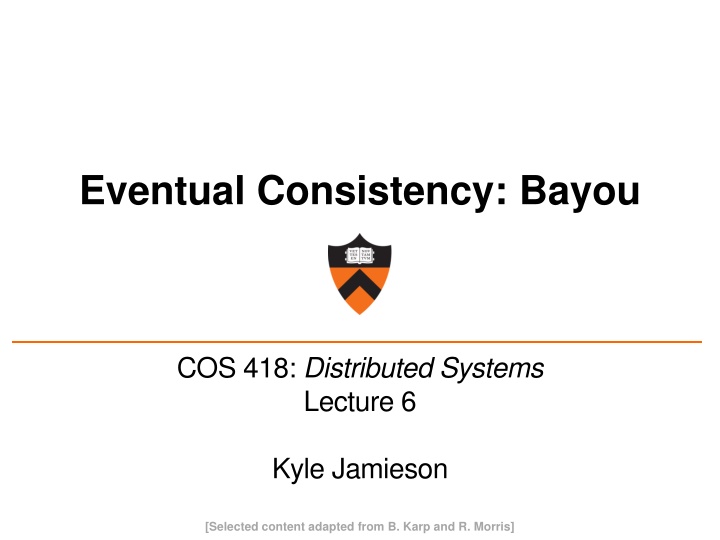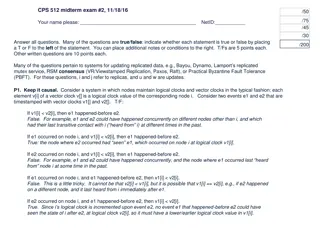
Eventual Consistency in Distributed Systems
Explore the concept of eventual consistency, its benefits, and challenges in distributed systems using the Bayou storage system as a case study. Learn about the trade-offs between availability and consistency in replicated storage systems.
Download Presentation

Please find below an Image/Link to download the presentation.
The content on the website is provided AS IS for your information and personal use only. It may not be sold, licensed, or shared on other websites without obtaining consent from the author. If you encounter any issues during the download, it is possible that the publisher has removed the file from their server.
You are allowed to download the files provided on this website for personal or commercial use, subject to the condition that they are used lawfully. All files are the property of their respective owners.
The content on the website is provided AS IS for your information and personal use only. It may not be sold, licensed, or shared on other websites without obtaining consent from the author.
E N D
Presentation Transcript
Eventual Consistency: Bayou COS 418: Distributed Systems Lecture 6 Kyle Jamieson [Selected content adapted from B. Karp and R. Morris]
Availability versus consistency Totally-Ordered Multicast kept replicas consistent but had single points of failure Not available under failures (Later): Distributed consensus algorithms Strong consistency (ops in same order everywhere) But, strongreachability requirements If the network fails (common case), can we provide any consistency when we replicate? 2
Eventual consistency Eventual consistency:If no new updates to the object, eventually all accesses will return the last updated value Common: git, iPhone sync, Dropbox, Amazon Dynamo Why do people like eventual consistency? Fast read/write of local copy of data Disconnected operation Issue: Conflicting writes to different copies How to reconcile them when discovered? 3
Bayou: A Weakly Connected Replicated Storage System Meeting room calendar application as case study in ordering and conflicts in a distributed system with poor connectivity Each calendar entry = room, time, set of participants Want everyone to see the same set of entries, eventually Else users may double-book room or avoid using an empty room 4
Paper context Early 90s when paper was written: Dawn of PDAs, laptops, tablets H/W clunky but showing clear potential Commercial devices did not have wireless. This problem has not gone away! Devices might be off, not have network access iPhone sync, Dropbox sync, Dynamo 5
Whats wrong with a central server? Want my calendar on a disconnected mobile phone i.e., each user wants database replicated on her mobile device No master copy But phone has only intermittent connectivity Mobile data expensive when roaming, Wi-Fi not everywhere, all the time Bluetooth useful for direct contact with other calendar users devices, but very short range 6
Swap complete databases? Suppose two users are in Bluetooth range Each sends entire calendar database to other Possibly expend lots of network bandwidth What if conflict, i.e., two concurrent meetings? iPhone sync keeps both meetings Want to do better: automatic conflict resolution 7
Automatic conflict resolution Can t just view the calendar database as abstract bits: Too little information to resolve conflicts: 1. Both files have changed can falsely conclude calendar conflict 2. Distinct record in each database changed can falsely conclude no calendar conflict 8
Application-specific conflict resolution Want intelligence that knows how to resolve conflicts More like users updates: read database, think, change request to eliminate conflict Must ensure all nodes resolve conflicts in the same way to keep replicas consistent 9
Whats in a write? Suppose calendar update takes form: 10 AM meeting, Room=305, COS-418 staff How would this handle conflicts? Better: write is an update function for the app 1-hour meeting at 10AM if room is free, else 11AM, Room=305, COS-418 staff Want all nodes to execute same instructions in same order,eventually 10
Problem Node A asks for meeting M1 at 10AM, else 11AM Node B asks for meeting M2 at 10AM, else 11AM Node X syncs with A, then B Node Y syncs with B, then A X will put meeting M1 at 10:00 Y will put meeting M1 at 11:00 Can t just apply update functions when replicas sync 11
Insight: Total ordering of updates Maintain an ordered list of updates at each node Write log Make sure every node holds same updates And applies updates in the same order Make sure updates are a deterministic function of database contents If we obey the above, sync is a simple merge of two ordered lists 12
Agreeing on the update order Timestamp: local timestamp T, originating node ID Ordering updates a and b: a < b if a.T < b.T, or (a.T = b.T and a.ID < b.ID) 13
Write log example 701, A : A asks for meeting M1 at 10AM, else 11AM 770, B : B asks for meeting M2 at 10AM, else 11AM Timestamp Pre-sync database state: A has M1 at 10 AM B has M2 at 10 AM What's the correct eventual outcome? The result of executing update functions in timestamp order: M1 at 10 AM, M2 at 11 AM 14
Write log example: Sync problem 701, A : A asks for meeting M1 at 10AM, else 11AM 770, B : B asks for meeting M2 at 10AM, else 11AM Now A and B sync with each other. Then: Each sorts new entries into its own log Ordering by timestamp Both now know the full set of updates A can just run B s update function But B has alreadyrun B s operation, too soon! 15
Solution: Roll back and replay B needs to roll back the DB, and re-run both ops in the correct order Bayou User Interface: Displayed meeting room calendar entries are Tentative at first B s user saw M2 at 10 AM, then it moved to 11AM Big point: The log at each node holds the truth; the DB is just an optimization 16
Is update order consistent with wall clock? 701, A : A asks for meeting M1 at 10AM, else 11AM 770, B : B asks for meeting M2 at 10AM, else 11AM Maybe B asked first by the wall clock But because of clock skew, A s meeting has lower timestamp, so gets priority No, not externally consistent 17
Does update order respect causality? Suppose another example: 701, A : A asks for meeting M1 at 10AM, else 11AM 700, B : Delete update 701, A B s clock was slow Now delete will be ordered before add 18
Lamport logical clocks respect causality Want event timestamps so that if a node observes E1 then generates E2, thenTS(E1) < TS(E2) Tmax = highest TS seen from any node (including self) T = max(Tmax+1, local time), to generate TS Recall properties: If E1 E2 on same node then TS(E1) < TS(E2) But TS(E1) < TS(E2) does not imply that necessarily E1 E2 19
Lamport clocks solve causality problem 701, A : A asks for meeting M1 at 10AM, else 11AM 700, B : Delete update 701, A 702, B : Delete update 701, A Now when B sees 701, A it sets Tmax So it will then generate a delete update with a later timestamp 701 20
Timestamps for write ordering: Limitations Ordering by timestamp arbitrarily constrains order Never know whether some write from the past may yet reach your node So all entries in log must be tentative forever And you must store entire log forever Problem: How can we allow committing a tentative entry, so we can trim logs and have meetings 21
Fully decentralized commit Strawman proposal: Update 10, A is stable if all nodeshave seen all updates with TS 10 Have sync always send in log order If you have seen updates with TS > 10 from every nodethen you ll never again see one < 10, A So 10, A is stable Why doesn t Bayou do this? A server that remains disconnected could prevent writes from stabilizing So many writes may be rolled back on re-connect 22
How Bayou commits writes Bayou uses a primary commit scheme One designated node (the primary) commits updates Primary marks each write it receives with a permanent CSN (commit sequence number) That write is committed Complete timestamp = CSN, local TS, node-id Advantage: Can pick a primary server close to locus of update activity 23
How Bayou commits writes (2) Nodes exchange CSNs when they sync with each other CSNs define a total order for committed writes All nodes eventually agree on the total order Uncommitted writes come after all committedwrites 24
Committed vs. tentative writes Suppose a node has seen every CSN up to a write, as guaranteed by propagation protocol Can then show user the write has committed Mark calendar entry Confirmed Slow/disconnected node cannot prevent commits! Primary replica allocates CSNs 26
Tentative writes What about tentative writes, though how do they behave, as seen by users? Two nodes may disagree on meaning of tentative (uncommitted) writes Even if those two nodes have synced with each other! Only CSNs from primary replica can resolve these disagreements permanently 27
Example: Disagreement on tentative writes Time A B C sync W 0, C W 1, B W 2, A Logs 2, A 1, B 0, C local TS, node-id 28
Example: Disagreement on tentative writes Time A B C sync W 0, C W 1, B sync W 2, A Logs 1, B 1, B 2, A 0, C 2, A local TS, node-id 29
Example: Disagreement on tentative writes Time A B C sync W 0, C W 1, B sync W 2, A Logs 1, B 0, C 0, C 1, B 2, A 1, B 2, A 2, A local TS, node-id 30
Example: Disagreement on tentative writes Time A B C sync W 0, C W 1, B sync W 2, A Logs 1, B 0, C 0, C 1, B 2, A 1, B 2, A 2, A local TS, node-id 31
Tentative order commit order Time A Pri C B W -,10, A W -,20, B sync sync Logs -,10, A -,20, B -,10, A -,20, B CSN, local TS, node-id 32
Tentative order commit order Time A Pri C B sync sync sync Logs 5,20, B -,10, A 6,10, A -,20, B 5,20, B 5,20, B 6,10, A -,10, A -,20, B 6,10, A CSN, local TS, node-id 33
Trimming the log When nodes receive new CSNs, can discard all committed log entries seen up to that point Update protocol CSNs received in order Keep copy of whole database as of highest CSN Result:No need to keep years of log data 34
Can primary commit writes in any order? Suppose a user creates meeting, then decides to delete or change it What CSN order must these ops have? Create first, then delete or modify Must be true in every node s view of tentative log entries, too Rule: Primary s total write order must preserve causal order of writes made at each node Not necessarily order among different nodes writes 35
Syncing with trimmed logs Suppose nodes discard all writes in log with CSNs Just keep a copy of the stable DB, reflecting discarded entries Cannot receive writes that conflict with stable DB Only could be if write had CSN less than a discarded CSN Already saw all writes with lower CSNs in right order: if see them again, can discard! 36
Syncing with trimmed logs (2) To propagate to node X: If X s highest CSN less than mine, Send X full stable DB; X uses that as starting point Xcan discard all his CSN log entries X plays his tentative writes into that DB If X s highest CSN greater than mine, Xcan ignore my DB! 37
How to sync, quickly? What about tentative updates? A B -,10, X -,20, Y -,30, X -,40, X -,10, X -,20, Y -,30, X B tells A: highest local TS for each other node e.g., X 30, Y 20 In response, A sends all X's updates after -,30,X , all Y's updates after -,20,X , & c. This is a version vector ( F vector in Figure 4) A s F: [X:40,Y:20] B s F: [X:30,Y:20] 38
New server New server Z joins. Could it just start generating writes, e.g. -, 10, Z ? And other nodes just start including Z in their version vectors? If A syncs to B, A has -, 10, Z But, BhasnoZ in its version vector A should pretend B s version vector was [Z:0,...] 39
Server retirement We want to stop including Z in version vectors! Z sends update: -, ?, Z retiring If you see a retirement update, omit Z from VV Problem: How to deal with a VV that's missing Z? A has log entries from Z, but B s VV has no Z entry e.g. A has -, 25, Z , B s VV is just [A:20, B:21] Maybe Z has retired, B knows, A does not Maybe Z is new, A knows, B does not Need a way to disambiguate 40
Bayous retirement plan Idea: Z joins by contacting some server X New server identifier: id now is Tz, X Tz is X s logical clock as of when Z joined X issues update -, Tz, X new server Z 41
Bayous retirement plan Suppose Z s ID is 20, X A syncs to B A has log entry from Z: -, 25, 20,X B s VV has no Z entry One case: B s VV: [X:10, ...] 10 < 20, so B hasn t yet seen X s new server Z update The other case: B s VV: [X:30, ...] 20 < 30, so B once knew about Z, but then saw a retirement update 42
Lets step back Is eventual consistency a useful idea? Yes: people want fast writes to local copies iPhone sync, Dropbox, Dynamo, & c. Are update conflicts a real problem? Yes all systems have some more or less awkward solution 43
Is Bayous complexity warranted? i.e. update function log, version vectors, tentative ops Only critical if you want peer-to-peer sync i.e. both disconnected operation andad-hoc connectivity Only tolerable if humans are main consumers of data Otherwise you can sync through a central server Or read locally but send updates through a master 44
What are Bayous take-away ideas? 1. Update functions for automatic application- driven conflict resolution 2. Ordered update log is the real truth, not the DB 3. Application of Lamport logical clocks for causal consistency 45
Wednesday topic: Peer to Peer Systems and Distributed Hash Tables 46




